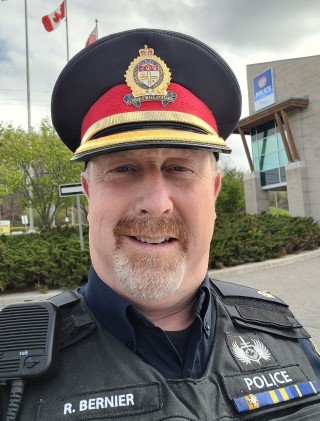60 Years of Partnerships: Acting Superintendent Rob Bernier’s Story
 Following his high school experience, Ottawa Police Service (OPS) Acting Superintendent Rob Bernier, a Montreal native, thought he was bound for a career in the sciences when he started Collège d'enseignement général et professionnel, better known as CEGEP. But a series of experiences in his personal life left him wondering if perhaps he was meant for a different calling.
Following his high school experience, Ottawa Police Service (OPS) Acting Superintendent Rob Bernier, a Montreal native, thought he was bound for a career in the sciences when he started Collège d'enseignement général et professionnel, better known as CEGEP. But a series of experiences in his personal life left him wondering if perhaps he was meant for a different calling.
Fast forward nearly 30 years, and not only is Rob a 27 year policing veteran and father of two, but he has also committed his entire career working with the OPS – the last four years being a police champion for MedicAlert’s Connect Protect Program.
Prior to 2017, Rob knew of MedicAlert and its mission to provide high quality health information at a time when someone is experiencing a medical emergency. However, like many others, he associated MedicAlert with things such as allergies and asthma. It wasn’t until he and his colleagues at the Ontario Public Order Advisory Committee (an Ontario police search and rescue ‘think tank’ ) were discussing the gaps in vulnerable person registries – and the need to connect the few existing disparate registries across the province digitally – that a solution was discovered.
“When police talk about vulnerable members of the community and the need to support them through a registry, we are thinking predominantly about people living with Alzheimer’s and other dementias, people living with autism, people living with Fetal Alcohol Syndrome Disorder, people living with Acquired Brain Injury or others living with mental health conditions,” he says. “These are the individuals that find themselves in situations where 911 is called by loved ones, caregivers or good Samaritans needing police to respond in order to help resolve the crisis. The challenge that existed was that registries to support these vulnerable people were generally nonexistent, and of the few registries out there, they were limited to supporting a specific sector and developed at a hyper-local level. Police had limited or no means to proactively access critical information about the involved vulnerable person that would have otherwise helped officers deescalate or resolve the crisis at hand. Local registries can be limiting when people travel, because a registered vulnerable person’s information won’t be available to police in other jurisdictions.”
Enter MedicAlert.
Little did Rob know that just 18 months earlier, MedicAlert had launched a pilot project with Durham Regional Police called Connect Protect. The highly successful program provides police dispatchers with digital access to the MedicAlert Subscriber Health Information Database (SHID) so that they can relay information to frontline officers who were either en-route to the scene, or who are on scene but focused on managing a crisis.
“If the person calling 911 can identify that the involved vulnerable person is on the MedicAlert registry or if officers, when on scene, can identify that the involved person is wearing the special color-coded MedicAlert ID for people with Alzheimer’s or autism, police have the opportunity to access essential information in a very timely manner that will support and assist the officers with adopting a more effective response to the crisis at hand,” he says. “It may be as simple as helping identify a disoriented person and get them safely home. It could be gathering information on wandering history and places that the person is attracted to in order to more effectively direct resources to find that person as quickly as possible in the best possible condition. It could also be tips on effective ways to communicate with the person or identifying known triggers and calming techniques to line officers up to successfully de-escalation the situation. At the end of the day, when it comes to these types of calls, that vulnerable person’s safety and wellbeing is our officers’ number one priority. MedicAlert supports us in achieving that goal.”
In 2017 the Ottawa Police Service joined MedicAlert’s Connect Protect program and Rob took on the cause helping us to expand Connect Protect to more than 50 police services today, with more than a dozen more set to be onboarded to the program in 2021.
Rob has also continued to champion our digital innovation work and is now a part of a special project team working with MedicAlert and several software companies to create instantaneous digital queries between SHID and the Computer Aided Dispatch (CAD) systems used by police services.
“For us it’s all about the early identification that someone that we are interacting with or about to interact with is on the MedicAlert Registry and having access to the registry information as fast as we can. Having a system that can understand a digital query using partial or inaccurate information – which is often what we as police officers are working with – means we will be better equipped to deal with these situations in the most effective way.”
The special pilot project called HELP-911 will take several months to complete. If successful, it will be made available to police services nation-wide.
“I’ve had a vision for something like this for a long time,” says Rob. “It’s great to see this pilot coming to fruition in this stage one pilot project. In phase two, my hope is that we’ll be able to connect Medic Alert to the Canadian Police Information Centre (CPIC) system which is where police conduct most of their queries.”
In the meantime, Rob will continue his public speaking engagements out in the community and the occasional media interview to share his support for MedicAlert and the Connect Protect Program.



